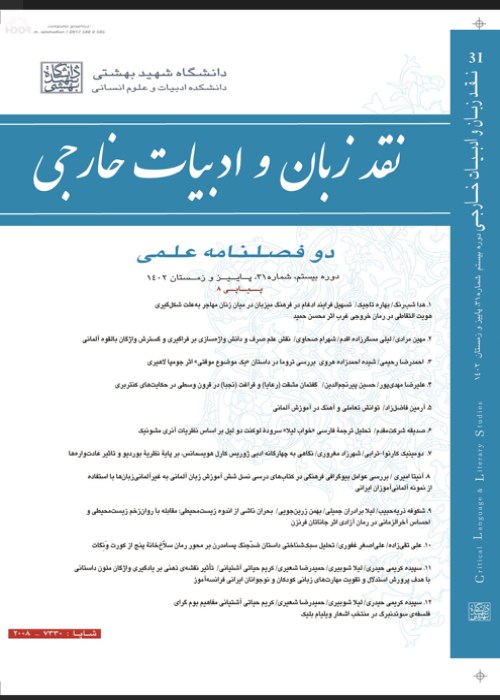Shakespeare and the Holy Quran: Religious Tragedy of Hamlet and Evolution of Soul in Renaissance Man
William Shakespeare, the Renaissance Dramatist, Influenced by the Bible, the Middle Age-Crusade-Renaissance relationship between England and Islam, and knowledge of Latin, with religious debates, inaugurates a new Islamic discourse in the tragedy of Hamlet based on the Holy Qur'an. In his discourse, the nature of the man, as the pure God’s creature, is cognized through the existence of vice and virtue of the soul, and the inherent tendency of the soul for virtuous perfection even after death, for some human beings, which is called evolution of the soul, thus re-creates a good human. In this metaphysical approach, based on physics, the relationship between matter and form is like the intrinsic relationship between body and soul in which the soul as the essence and body form, has endowed with movement and evolution, and in addition to life-giving, identifies the changing matter and body to which it always belongs. This is called hylomorphism which is the basis of Substantial motion, physical resurrection, and causality. Aristotle's theory of hylomorphism and Mulla Sadra’s Islamic views are examined in this religious discourse. This research results in, inter alia, the re-presentation of Muhammad (PBUH) and depletion of constant accusations.
Aristotle, the ancient Greek philosopher, is the founder of Islamic philosophy including transcendental wisdom while Christian thoughts have not been influenced by the Greek philosophies (Brague 252). Mulla Sadra as the founder of Quranic thought succeeded in uniting the four currents of thought, namely theology, mysticism, Plato’s, and Aristotle’s. Mulla Sadra’s thoughts are based on the Shiite religion of Islam including the principles of the Quran, Hadith, reason, and consensus leading to human salvation. Mulla Sadra’s philosophy is specific to the Quran in terms of an all-inclusive essential change such as ascending and descending purgatory and substantial change in everything, constant and new occurrence, and God as the pure cause (existential ontology). Additionally, purgatory in Islam is a place such as the grave where the souls of dead bodies reside (BRILL 100). William Shakespeare, the renaissance dramatist, was affected by the Anglo-Islamic rapport from the Crusades to the16th. Century renaissance in which different attitudes to Islam and Muhammad (PBUH) have been held. The allusion to Muhammad’s name is testified completely only in the Holy Quran and not the Bible. The Holy Quran was translated into Latin almost 5 decades earlier than Shakespeare’s time, and Shakespeare knew fully the Latin language. To get to know Bible, one should be familiar with the Holy Quran. The renaissance period was the rebirth of ancient Greek thoughts inter alia Aristotle, Plato, etc. pinpointing the evolution of man’s soul. Shakespeare attempts to inaugurate an Islamic discourse based on the evolution of man’s soul in this world and purgatory for some men to reach a virtuous perfection which results in a variety of findings.
Dolat Abadi (1388) in comparing Hamlet with Imam Hossein, considers both martyr and hero fighting against evil and cruelty traced in all human society which is targeted at accomplishing an ideal, religious and virtuous morality. This is deeply rooted in the mind of a true man which bespeaks the inclinations of a virtuous soul as well. Thind (2014) represents Hamlet as a true religious hero who has a faith in Christianity and the doctrine of the renaissance. Therefore, he is precluded from committing any evil action or crime for his revenge. In other words, his revenge is carried out for a promising achievement based on religion which destroys evil and leads towards virtue and morality. This revenge tragedy is different from its contemporary tragedies in terms of its moral and virtuous predispositions.
Considering Shakespeare’s view seems to manifest the Islamic Philosophy of Mulla Sadra originated in and was proposed earlier by the Greek philosopher, Aristotle, whose philosophy is based upon physics regarding the dynamic relationship between matter and form as an embodiment of body and soul, a comparative philosophical methodology hinging upon a spiritual-religious outlook has been selected for this study. It suggests, on the one hand, the antiquity of (Islamic) philosophy founded on the Holy Qur’an and Hadith with its specific categories hinging on the principles of existence and essence including God’s existence as the pure and first cause (existential ontology), and constant and new occurrences in substance as essential change dedicated to the Qur’anic thoughts, and on the other hand, the significance of the inspiring Greek thought. The philosophical theories of Mulla Sadra and Aristotle will be the foundations for our research method which are applied in the content analysis as observed in the behavior of characters in the tragedy.
The tragedy of Hamlet exhibits a virtuous perfection and enhancement of the soul for some men before death and in purgatory based upon the Islamic philosophy of Mulla Sadra which is rooted in the ancient Greek philosophies. Such a substantial change in man’s soul will bring about a myriad of findings among which one is noteworthy, i.e. a virtuous re-presentation of prophet Muhammad (PBUH) and depleting affronts carried against him by the west unaware of Islam and Muhammad.
- حق عضویت دریافتی صرف حمایت از نشریات عضو و نگهداری، تکمیل و توسعه مگیران میشود.
- پرداخت حق اشتراک و دانلود مقالات اجازه بازنشر آن در سایر رسانههای چاپی و دیجیتال را به کاربر نمیدهد.


